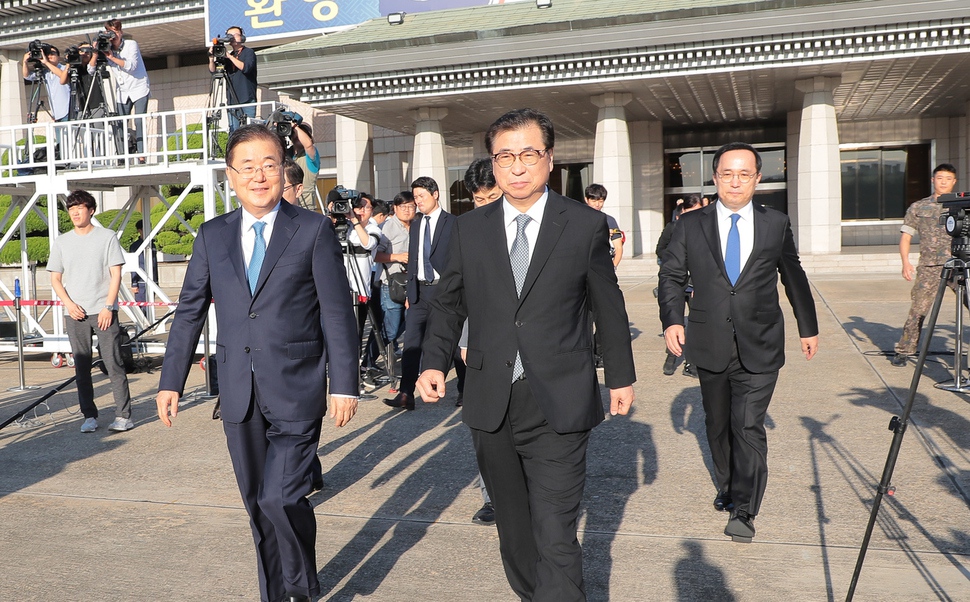 |
|
The special delegation to North Korea, headed by Blue House National Security Office Director Chung Eui-yong, leaves for Pyongyang from Seoul Air Base in Seongnam, Gyeonggi Province on Sept. 5. (Blue House photo pool)
|
Rodong Sinmun’s resumed vitriol regarding US indicator of high tensions
South Korean President Moon Jae-in’s special delegation to North Korea left for Pyongyang at 7:30 am on the morning of Sept. 5. There are no delusions that the special delegation’s success is guaranteed. The lesson learned from the cancellation of what would have been US Secretary of State Mike Pompeo’s fourth trip to North Korea is that affairs on the Korean Peninsula are complex and mixed up. A column titled “To obstruct inter-Korean relations is to obstruct the future of the US” that ran in the Sept. 4 edition of North Korea’s Rodong Sinmun said, “The US is the party that bears the greatest responsibility for splitting our beloved country into two halves. All of our nation’s misfortune and pain, all of the blood and tears that we have shed, are a calamity and catastrophe wrought by the US.” This is the sort of savage criticism that hasn’t been seen since the North Korea-US summit on June 12. It bears witness to the intensity of the dispute between North Korea and the US over what to do next: taking steps toward denuclearization or officially ending the Korean War. The path forward on the Korean Peninsula is hidden in the fog. Will the special delegation to Pyongyang be able to create the momentum to move Korean Peninsular affairs forward once again? There are three variables that are sure to have a bearing on the special delegation’s success or failure. First is the question of whether the special delegation is holding the “American card” in its hand. If the envoys can offer US concessions for North Korea that have been cleared in advance with Washington, that alone—whether those concessions are great or small—would likely ensure the visit’s success. But sources who are familiar with these matters suggest that the special delegation doesn’t have that American card. Apparently relevant here is a tweet posted by Im Jong-seok, Moon’s chief of staff, about the special delegation’s visit to the North: “We go with the urgency of having to create new conditions and circumstances by ourselves.” Second is whether North Korean leader Kim Jong-un is willing to make another bold move. When Kim met Moon’s special delegation this past March, he paved the way to the North’s first ever summit with the US in June by expressing his willingness to hold a summit with South Korea in April, his commitment to denuclearization and dialogue with the US and a moratorium on nuclear tests and missile launch tests. If Kim announces additional measures toward denuclearization during this meeting, too, it could break through the deadlock on the Korean Peninsula. While this is the ideal outcome, the general view in the government is that it isn’t very likely, either. The current pessimism is due to the continuing bickering under the current alignment, which was just taking shape back in March. No “miracle cure” likely to emerge Third is whether Moon will make a bold move of his own and whether South Korea can come up with its own “creative alternative” that could be a game changer. “The special delegation isn’t going empty-handed, but they’re unlikely to have a silver bullet,” said a well-informed source. The implication is that we shouldn’t be expecting some kind of “miracle cure” that will instantaneously turn everything around. But officials in the know say it’s clear that Moon means to have the special delegation convey to Kim his determination to speed up the implementation of the Apr. 27 Panmunjom Declaration during the inter-Korean summit in September. The South Korean government expects that the special delegation will be able to meet Kim in Pyongyang. Note the word choice—not “hopes,” but “expects.” When the special delegation visited North Korean in March, they spent four hours with Kim and ate dinner with him. “This is a situation where North Korea needs a microphone, too,” said an analyst at a state-funded research institution. This analyst thinks that Kim will convey a message to the outside world in his meeting with the special delegation. Presuming that the special delegation is given an audience with Kim, Seoul is reportedly planning to engage in some persuasive diplomacy with the US by immediately sending the special envoys Chung Eui-yong and Suh Hoon to the US to personally convey Kim’s message to US President Donald Trump. This amounts to arranging “indirect dialogue” between Kim and Trump, which is the key, if unspoken reason that Moon brought up the idea of sending the special delegation to the North. Given all these considerations, the minimum condition for the special delegation’s success is getting to meet Kim Jong-un. By Lee Je-hun, senior staff writer Please direct comments or questions to [english@hani.co.kr]






